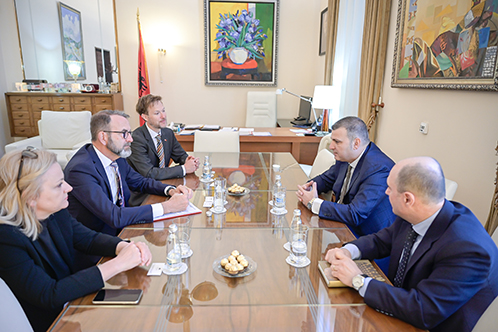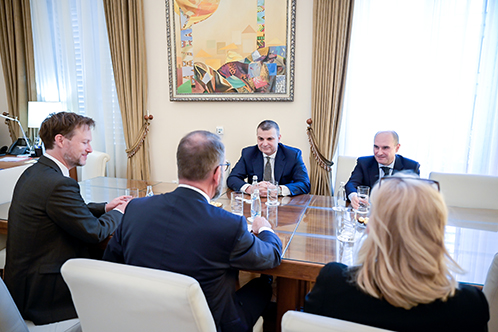BANK OF ALBANIA
PRESS RELEASE
Governor Sejko meets the Director of Operations of the Swiss Secretary of State for Economic Affairs, Mr Martin Saladin
Publication date: 13.05.2022
On 13 May 2022, the Governor of the Bank of Albania, Mr Gent Sejko, held a meeting at the premises of the Bank of Albania with the Director of Economic Operational at the Swiss State Secretariat of Economic Affairs (SECO)*, Mr Martin Saladin.
The meeting was realised in the framework of the successful finalisation of the second cooperation agreement with SECO, and it was attended by the Deputy Head of the Swiss Embassy in Tirana, Mr Patrick Meier, as well as other senior representatives from respective institutions.

Governor Sejko thanked the Swiss Government for its fruitful support and cooperation, and expressed his very positive appreciation regarding the projects and activities organized as part of this cooperation.
In this regard, Governor highlighted that this collaboration has provided assistance to the Bank of Albania in both the research and in the decision-making process, by developing analysis and forecasting models, through the implementation of new models and the improvement of policy-making.
To this end, the Bank of Albania has conducted a series of activities of various focuses and benefits, starting from the participation in high-level scientific and academic conferences, lectures from renowned professors in the field of central banking, to detailed assistance missions in relation to macroeconomic modelling, financial stability issues, monetary policy, etc.

More concretely, 15 activities of various topics were realised in total with the participation of 66 employees from the Bank of Albania, such as: training on R software, conference on climate changes, workshop on the implementation of the new Basel approach, workshop on inflationary expectations, etc.
Also, during the meeting, Governor Sejko presented an overview of the Albanian economic and financial situation, as well as the work and the results of the policies of the Bank of Albania. In this overview, he emphasized the stability of the Albanian economic and financial system in face of the crises, such as the Covid-19 pandemic, the energy crisis, and the upswing in prices. Many factors have contributed to the successful overcoming of the crises, among which is the proactive role of the monetary policy.
The representatives of SECO thanked the Bank of Albania for its support through active participation and organization of joint activities and evaluated their programme with the Bank of Albania as one of their best and most successful ones.

Next, the Deputy Head of the Swiss Embassy in Tirana, Mr Patrick Meier said that the continuation of joint development projects is supported and encouraged by the positive results achieved by the current programme and the acumen demonstrated by the Bank of Albania.
The bilateral discussions continued regarding future cooperation, which will be further expanded to support education and financial inclusion (focusing specifically on micro-lending and its relevant institutions), the use of payment systems and instruments, and the extension of the assistance to other departments, such as the Department of Supervision.
After the meeting, Governor Sejko participated in an activity organised in the framework of the Swiss cooperation programme in Tirana, by means of which Switzerland is supporting Albania in developing an advanced society and a competitive economy, with a view to further aid the integration of Albania in Europe.
_________
* The State Secretariat for Economic Affairs is the centre of expertise of the Swiss federal government, which examines all the main issues related to economic policies. Its purpose is to ensure sustained economic growth, enabling the necessary conditions through regulatory and economic policies. Since 1992, SECO has been supporting central partner countries' banks, based on increasing demands for technical assistance in the field of central banking, through a strategic co-operation with the Graduate Institute of International Development Studies. Collaboration with some central banks generally consists of general advisory services and specific activities adjusted for the country, in the form of Technical Assistance and Training Programs (TATPs).

 Twitter
Twitter
 Youtube
Youtube
 Facebook
Facebook
 Flickr
Flickr
 RSS
RSS
 Subscribe
Subscribe
 Feedback
Feedback